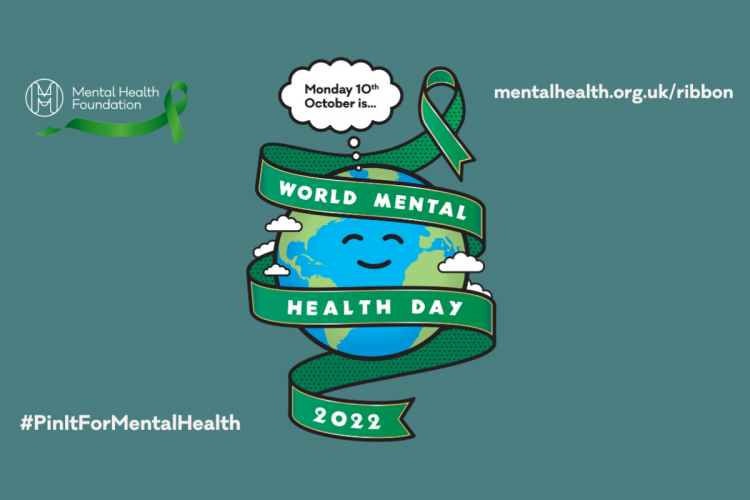World Mental Health Day – Monday 10th October
Posted 10th October 2022
The World Health Organisation recognises World Mental Health Day on 10 October every year.
The theme of 2022’s World Mental Health Day, set by the World Federation for Mental Health, is ‘Make mental health and wellbeing for all a global priority’.

For over 70 years, work has been ongoing to make sure that mental health is treated on a par with physical health. Mental health problems exist in our lives, families, workplaces and communities, impacting everyone. We need to do as much as possible to prevent mental ill-health – as individuals and as a society. Action from national and local government is needed to prioritise reducing the factors known to pose a risk to people’s mental health, enhancing those known to protect it and creating the conditions needed for people to thrive.
World Mental Health Day is also a chance to talk about mental health in general, how we need to look after it, and how important it is to talk about things and get help if you are struggling.
As recruiters, we often talk about a work-life balance and how achieving this can protect your mental health – but this is often easier to talk about than to actually achieve.
A healthy work-life balance will mean different things to us all. It’s not so much about splitting your time 50/50 between work and leisure but making sure you feel fulfilled and content in both areas of your life. A healthy balance could be:
- meeting your deadlines at work while still having time for friends and hobbies
- having enough time to sleep properly and eat well
- not worrying about work when you’re at home.
This can be challenging if, for example, we also have caring responsibilities, a demanding boss or health difficulties.

How do I know if my work-life balance is unhealthy?
It can be easy to normalise working long hours or being under extreme stress, especially if we’ve been doing it for a long time or all our colleagues are in the same boat. Our assumptions and habits around work can become deep-rooted unless we take a step back once in a while.
It’s not always possible to make changes at work: if you’re on a zero-hours contract, you might not feel comfortable speaking up, for instance, or you might need to work long hours to earn enough money to pay your bills. But for those who can make changes, recent research suggests regularly checking your work-life balance by following five steps.
- Pause. Ask yourself: what’s currently causing me stress or unhappiness? How is that affecting my work and personal life? What am I prioritising? What am I losing out on? We often don’t take the time to reflect on work until there’s a major life event, such as the birth of a child or the loss of someone close to us. But just pausing and thinking about your priorities can help you discover whether the way you’re living and working is right for you
- Pay attention to your feelings. Now you’re more aware of your current situation, how does it make you feel? Are you fulfilled and happy or angry and resentful? Being aware of your feelings can help you decide which changes you want to make
- Reprioritise. Think about what needs to change. For example, you might want to ask yourself if working long hours is worth losing out on family time or whether working weekends is worth losing out on your social life
- Consider your alternatives. Is there anything at work you can change to meet your new priorities?
- Make changes. Maybe that’s asking for flexible hours, making sure you use all your annual leave or not checking your emails at the weekend, for example

Helping yourself
There are steps you can take to improve your work-life balance.
It can be difficult or impossible to stand up for yourself at work if you’re precariously employed or worried about losing your job. Make sure you know your rights (see below) and see if any of our tips feel safe for you to try.
- Understand your rights at work. Citizens Advice has information on contracts, working hours, sick pay, parental leave and more. For example, if you have a disability (which can include mental and physical conditions), your employer might have a duty to make reasonable adjustments. This could include changes to your working hours.
- Speak up when the expectations and demands of work are too much. Your manager and employer need to know where the pressures lie in order to address them.
- Try to ‘work smart, not long’. This involves prioritising – allowing yourself a certain amount of time per task – and trying not to get caught up in less productive activities such as unstructured meetings.
- Take proper breaks at work. For example, take at least half an hour for lunch and get out of the workplace if you can. You’re legally entitled to certain breaks during the day and working week: Gov.uk has more information.
- Try to draw a line between work and home. If you work from home, try to keep to a routine, make a dedicated workspace and switch off when the working day is over. The NHS website has more tips on working from home.
- Work-related stress can seriously affect your mental health. Ways to reduce stress include exercise, eating well or supportive friendships.
- If work makes you feel you don’t have quality time for your partner or friends, read Relate’s tips on realigning your work-life balance. They include scheduling time together, getting help with chores and childcare and making every second count if you don’t have much spare time.
- Keep track of your working hours over weeks or months rather than days. This will give you a better picture of your work-life balance. Factor in hours spent worrying or thinking about work, too – they’re a good indicator of work-related stress. If possible, assess your work-life balance with your colleagues and management staff. The more visible the process, the more likely it is to have an effect.

How can employers help?
Finding a balance shouldn’t just be down to individual employees. The role of an organisation and their management cannot be underestimated and they should;
- encourage a culture of openness so you can speak up if you’re under too much pressure
- train managers to spot stress and poor work-life balance
- offer flexible and remote working where possible
- encourage breaks, whether that’s during the working day or by using annual leave
- regularly review your workload to make sure it’s achievable
- give you time off to volunteer
- increase support for parents and carers, so they’re not forced to leave
- allow you to attend counselling and support services during working hours as they would for other medical appointments
- encourage stress-relieving activities such as lunchtime exercise or relaxation classes
- ask employees what would improve their work-life balance
Posted by Sarah Walker
Share this article.
Higher Education
Posted
The James Hutton Institute is excited to announce the appointment of Anne Corbin as our new Chief Financial Officer.
Anne joins the Hutton from social care charity VSA, where she has worked since 2019, serving as CFO since 2021. A fellow of the Association of Certified Chartered Accountants, she has 25 years of experience working in finance, and has led teams focusing on procurement, financial operations and a number of other corporate services. Anne’s main areas of focus are financial resilience, good governance, and social responsibility, and she plans to continue promoting these principles through her work at the Hutton.
Higher Education
Posted
Following a competitive recruitment process led by Dixon Walter, Anglia Ruskin University (ARU) has appointed John Iveson as its new Director of Estates and Facilities to take responsibility for buildings and infrastructure across its campuses.
John brings a wealth of experience from hospitality, sport and education.
Higher Education
Posted
Dixon Walter have successfully supported the recruitment of a new senior estates team at the Royal Northern College of Music. This includes the fantastic appoinment of Brent Wills as Director of Estates and Facilities.